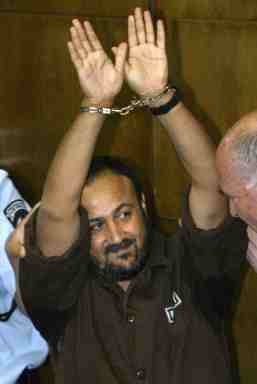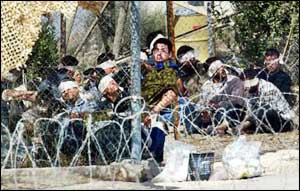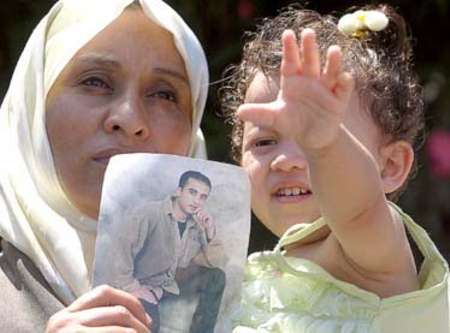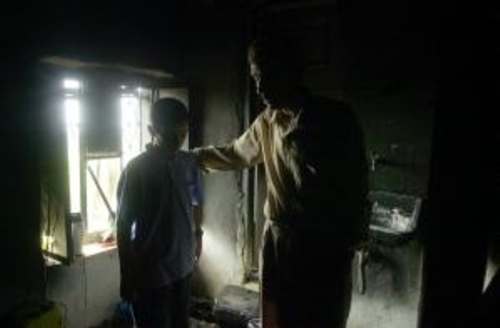
september 2004

"When goodness grows weak,
When evil increases,
I make myself a body.
In every age I come back
To deliver the holy,
To destroy the sin of the sinner,
To establish righteousness."
Bhagavad Gita
* * * * * * * * * * * * *
Some 1,500 Palestinian political prisoners housed in three main Israeli jails began a hunger strike Sunday morning. Prisoners are drinking water but not eating. In reaction to the strike, the Prisons Service imposed additional restrictions, removing radios and television sets from jail cells, did not
distribute newspapers, canceled family visits and stopped selling cigarettes.
Palestinian Political Prisoners Started the Open Ended Hunger Strike
Palestinian Political Prisoners in Nafah, Eishel, and Hadarim Prisons rejected breakfast, marking the start of an open ended hunger strike. Prisoners in other prisons and detention centers will join the hunger strike in the coming days. Around 4,000 prisoners will join the first stage of the general hunger
strike. It is not known whether or when the remaining 4,000 Palestinians in military detention centers join the strike.
Israeli Prison Authority and Security officials rejected prisoners' demands, and insisted that political motivations are behind the prisoners' move. "Palestinian security prisoners can starve to death" Israeli Public Security Minister Tzachi Hanegbi said Friday, affirming that Israel does not intend to positively deal with prisoners' demands.
In protest against grieve human conditions inside Israeli jails, some 8,000 Palestinian political prisoners announced earlier this month their intention to start an open ended hunger strike on August 15. The prisoners are demanding public telephones in their cell blocks, the removal of glass separating them from visiting relatives, adequate health care, and an end to "intrusive" body searches. What is certain is that the prisoners are threatening to extend their hunger strike in a dramatic fashion, some even hinting that they would be willing to in fact die of hunger, imitating inmates in Turkey and Northern Ireland.
The prisons authority warned that if the hunger strike goes ahead, the prisoners will suffer the loss of existing privileges, including end to all family visits as well as a loss of television and radio privileges. The Prisons authority prepared two special units with expertise in crowd dispersal and mass evacuation of injured prisoners to hospitals.
LAWYERS' VISITS TO CENTRAL PRISONS
Lawyers face many difficulties when they visit Palestinian prisoners in Israeli jails. Prior to their visits they have to coordinate the visit with the prison's administration. A list that indicates the names of prisoners that the lawyer intends to visit and a power of attorney must be sent to the prison's administration. This restricts prisoners' access to a lawyer.
* Visits to criminal prisoners are easier. The procedures are usually quick. Lawyers generally have their ID cards and briefcases checked quickly before the visit.
* In the case of political prisoners, the lawyer has to send the name of the prisoner he intends to visit, together with a power of attorney. He/she then has to wait for one or two days to receive a response. Lawyers are not allowed to wait inside the prison building. They submit the names of the prisoners they intend to visit and wait outside the prison for long hours. On 24 June 2004, Addameer's lawyer Mahmoud Hassan had to wait over three hours before being allowed to enter Shatta Prison. Before entering the prison, lawyers are subjected to a personal search, which is sometimes carried out in a humiliating manner. They are forced to take off their shoes to be checked electronically.
* Recently, lawyers have not been allowed to bring their briefcases with them into some of the prisons. For example, in Shkema Prison ('Asqalan) lawyers may not bring their briefcases with them even if they want to attend a detention renewal session. Visits are carried out in special rooms that are restrictive - a physical barrier separates the prisoner and the lawyer. They can not communicate easily and directly: instead, they must communicate through an internal telephone. A prison guard who understands Arabic is usually present in the room. He/she takes notes, despite the decisions of the Israeli High Court regarding the illegality of this act. The High Court held that guards must be at a distance where he/she can see the prisoner but cannot hear the conversation between the prisoner and the lawyer. However, if a lawyer informs a prison guard of this requirement, a fight usually erupts, and the guard argues that he/she received orders from the prison administration to monitor the conversation, with the intention to restrict the prisoner's and lawyer's freedom to speak and argue freely.
* Many complaints have been submitted to the prison administration to protest these conditions. Recently, a petition has been submitted to the Attorney General and the Israeli Prisons Authority regarding the presence and behavior of prison guards in the visitation rooms. These officials responded that the guards believed that they were performing their duty, but that they would have them stop such behavior. On 24 June 2004, Addameer's lawyer, during a visit to a prisoner in Shatta, had to interrupt his conversation with his client many times to ask the guard to move away. The guard went away but then he came back again to listen to the conversation.
* Lawyers usually meet political prisoners in the same room where families meet with their sons who are held criminally. This, of course, hinders the visit and restrains the ability to talk.
Israeli media reported Tuesday, 10th August, that the detained elected member of the Palestinian Legislative Council (PLC) Marwan Al-Barghouthi -- in solitary confinement since his kidnapping from the West City of Ramallah in April 2002 -- was denied family or other
visits.

Palestinian Council of Ministers on Tuesday decried the Israeli assault on Palestinians in the Gilboa jail where the Israeli Occupation Forces (IOF) detain at least 800 anti occupation activists in the northern Israeli town of Kfar Saba, following a protest that was violently dispersed, wounding at least twenty detainees.
The main Palestinian prisoners’ association, the Prisoners’ Club, said in a statement Tuesday that at least 20 detainees had been wounded when an IOF elite riot squad used tear gas and batons to break up the detainees’ protest.
The protest began on Tuesday morning after detainees had all refused to have breakfast as an act of protest, it said.
The
detainees began their protest when an Israeli criminal
with intent showered them with boiling cooking oil,
exposing them to severe burnings, while the IOF soldiers
guarding the jail did not offer first aid to the three
burnt detainees, worsening their conditions.
UPDATE:Israel turns up heat on
prisoners Israel has launched a psychological war against
hundreds of Palestinian inmates on hunger strike for
better conditions. Prison officers are setting up
barbecues outside cells and have told guards to eat in
front of prisoners.
http://news.bbc.co.uk/1/hi/world/middle_east/3569760.stm
AUG 17th Palestinians march for
hunger strike prisoners as Israel tempts inmates The
crowds assembled outside the local offices of the Red
Cross before marching towards the Gaza headquarters of
the United Nations where they delivered a letter
addressed to Secretary General Kofi Annan, calling for
him to apply pressure on Israel and improve conditions
for the prisoners.

Using Dogs Against
Prisoners is Not a Secret Anymore
Translated by: Saed Bannoura, IMEMC, June 2004, 12:55
Despite the fact that several Palestinian detainees spoke about the army using trained dogs against them during interrogation, the media did not really take these facts for granted as it lacked concrete evidence. After several facts and information about methods of torture used against Iraqi detainees, and the pictures released showing the usage of dogs in torturing them, several Palestinian institutions specializing with the issues of the detainees started to speak up and reveal facts about the usage of dogs against Palestinian detainees during interrogation in order to achieved forced confessions.
Arab MK, Ahmad Tibi said that he received a letter from Hanegbi which includes his confession of using such methods. Tibi added that he presented several cases during the a session of the internal security committee in the Knesset, the cases included assaulting the detainees and torturing them. Tibi said that he received messages from Nael Al-Sakhl, Samir Sawafta, Rabee Hussein, Abdel-Karim Basshar, Mahmoud Al-Hamsheery, Aysar Al-Atrash, Nafeth Salim, Mohammad Olewi, Imsail Abu Eischa, Shaker Abu Kees and several other detainees.
It seems that
the torture methods were not enough, the Shabak, decided
to add additional methods which are resembled in using
wild dogs in guarding the detainees and detention camps.
The American newspaper “Washington Post”
revealed lately methods used by the Israeli army against
the Palestinians detainees, and said that “it in
fact exceeds the brutal methods used by American soldiers
in Abu Gharib prison in Iraq”.
Meanwhile, an Israeli source told the Israeli radio, that
the Shabak, went to Tel Aviv Municipality and requested
an “Amstav” dog, which is originally from
Germany, and the municipality wanted to kill it after it
attacked and killed a four years old child in front of
her mother in Tel Aviv.The source said that the security
devices intend to use this killer-dog in guarding the
Palestinian detainees in a detention camp. Arab Mk Azmi
Bishara, demanded forming a committee in order to
investigate the methods of torture used against the
Palestinian detainees, and added that he has information
about “using brutal methods” against the
detainees. Bishara said in a letter sent to “Prison
Authorities” department and to the Minister of
Internal Security in Israel, which stated that,
“tens of Palestinian detainees from the west Bank
and the Gaza Strip, and Israeli Arab detainees, are
subjected to various methods of torture in
“Shatta” and Majeddo” detention camps. Source:
Amin Abu Warda – Palestine News Network

7,500 Palestinians Humiliated, Tortured, And Living in
Wretched Conditions in Israeli Occupation Prisons
Since the beginning of the
Israeli occupation of Palestinian territories in 1967,
over 650,000 Palestinians have been detained by
Israel. This forms approximately 20% of the total
Palestinian population in the Occupied Palestinian
Territories (OPT). Considering the fact that the
majority of those detained are male, the number of
Palestinians detained forms approximately 40% of the
total male Palestinian population in the OPT.
As of 15 August 2004, there are approximately 7,500
Palestinian political prisoners being held in Israeli
prisons. Over 750 of these are administrative
detainees, held without charge or trial for indefinite
periods of time. 380 of the political prisoners are
aged 18 and under, 78 of whom are 16 years and
under. There are 106 Palestinian female political
prisoners, 20 of whom are mothers and 2 of whom gave
birth in prison, with their children remaining in prison
with them. Of the total 7,500 political prisoners,
3,800 are being held in civil prisons, with the remaining
political prisoners held in Israeli military detention
centers and prison camps.
The arrest and detention of Palestinians living within
the OPT is governed by a wide-ranging set of military
regulations that govern every aspect of Palestinian
civilian life. There are approximately 1500
military regulations governing the West Bank and over
1400 governing the Gaza Strip. The Israeli military
commander of the region issues military orders, and the
issuance of new orders often remains unknown and become
apparent when they are implemented, as the military
commander may issue new military regulations at any
moment.
Palestinians are tried within Israeli military courts
located within Israeli military centers in the OPT.
These military tribunals are presided over by a panel of
three judges appointed by the military, two of who often
do not have any legal training or background. These
tribunals rarely fall within the required international
standards of fair trial.
Israeli prisons and military detention camps are
primarily located within the 1948 borders of
Israel. There are a total of 5 interrogation
centers, 6 detention/holding centers, 3 military
detention camps, and about 20 prisons in which
Palestinians from the OPT are held. The location of
prisons within Israel and the transfer of detainees to
locations within the occupying power's territory are
illegal under international law and constitute a war
crime. The Fourth Geneva Convention explicitly
states that "Protected persons accused of offences
shall be detained in the occupied country, and if
convicted they shall serve their sentences therein."
(Article 47) Most of the Palestinian Prisoners are
being held in detention facilities located outside the
OPT.
As a result of an arbitrary permit system which governs
Palestinians movement within the Occupied Palestinian
Territories, including East Jerusalem, and to and from
the 1948 borders of Israel, family visits to detainees
are often not possible, extremely infrequent, or
impossible. Since the beginning of the current
Intifada in September 2000, family visits have been
prevented repeatedly and for long periods at a time.
Under Israeli military regulations a Palestinian can be
detained for up to 8 days without the Israeli military
informing the detainee of the reason for his/her arrest
and without being brought before a judge. Between
April and June 2002, this period of time was increased by
Israeli military order 1500 to 18 days. Following
or during the 8 days of detention, a detainee is sent to
an interrogation center, charged with an offense, given
an administrative detention order, or released.
A Palestinian detainee can be interrogated for a total
period of 180 days, during which he/she can also be
denied lawyer visits for a period of 60 days.
During the interrogation period, a detainee is often
subjected to some form of torture or cruel, inhuman and
degrading treatment ranging in extremity, whether
physical or psychological. The use of practices
that constitute torture during interrogation has been
legalized within the Israeli judicial system and
permitted in individual cases in which the GSS deems a
detainee a threat to state security or a "ticking
bomb". In some instances, detainees have died
while in custody as a result of torture.
Confessions extracted through torture are admissible in
court and/or military tribunal.
Administrative detention, arrest without charge or trial,
has been used as a form of collective punishment by the
Israeli military against Palestinians, illegal in this
form under international law. For example, during
the period of March 2002 to October 2002, Israeli
occupying forces arrested over 15,000 Palestinians during
mass arrest campaigns, rounding up males in cities and
villages between the ages of 15 to 45. In October
2002, there were over 1,050 Palestinians in
administrative detention.
Administrative detention is indefinitely renewable under
military regulations. A detainee may be given an
administrative detention order for a period of between 1
to 6 months, after which the order may be renewed
again. Administrative detention is based on secret
evidence brought forward during military tribunals, to
which neither the detainee nor his/her lawyer have access
to. One of the longest Palestinian administrative
detainees remained in custody for over 8 years, without
being charged with a crime.
Under military regulations in force in the OPT, a child
over the age of 16 is considered an adult, contrary to
the defined age of a child as under 18 in the UN
Convention of the Rights of the Child, to which Israel is
a signatory. In practice, Palestinian
children may be charged and sentenced in military courts
beginning at the age of 12. Between the age of
12-14, children can be sentenced for offences for a
period of up to six months. For example, a child
who is charged for throwing a stone can be sentenced to
six months imprisonment. After the age of 14,
Palestinian children are tried as adults. There are
no juvenile courts and children are often held and serve
their sentences in cells with criminal prisoners and are
often not separated from adults, illegal under
international law.
-

According to the Palestinian prisoners society (PPS), 95%
of the imprisoned are civilians. In some cases, complete
families were arrested and put in jail. More than 12
prisons and detention centers serve to accommodate these
prisoners.
The prisoners of the notorious Al Ramlah jail accounted their affidavits about the worsening incarceration conditions and humiliation.
The Palestinian prisoner society (PPS) reported that the PPS‘s lawyer Hanan Al Khatib paid a visit to a number of the inmates in the cell No. (8) of Al Ramlah prison, absorbing 60 ones. It is a newly-established one that is to be used to isolate the inmates.
Affidavit
The prisoner Suman, mentioned that conditions inside the potential overcrowded solitary cell are extremely dire as there are 8-10 prisoners in a cell that likely absorbed only four.
“The hygiene situation terribly goes downhill as the humidity fills the cells” Suman told the PPS’s lawyer.
He pointed out the meals served to the prisoners were very insipid and most of prisoners were unjustifiably denied family visits. He added that his wife was deprived of visiting him since his arrest.
“We will begin an open hunger strike protesting the wretched conditions the prisoners have been subjected to “the PPS’s lawyer was quoted as saying.
He spoke out the prisons authorities were not extending necessary medicine to the sick captives and only supplying them with sedatives, the sick prisoner Reyad Al Amour, suffering a heart disease, in a miserable condition and the prisoner Ibraheem Al Beitar, afflicted with blood coagulation and the worsening health conditions of the prisoner Eyad Fa’noon, suffering backache due to the cruel repression exercised on him by the interrogators of Al Maskoubyia jail.
He disclosed the wounded prisoners, who in a very need of a surgical operation to remove the shrapnel instilled their bodies, For example, the prisoners Omar Al Shurabji , Nu’man Ebyiat And Baker Darghma.
The prisoner Nu’man Jubran, from Bethlehem city was arrested on 19 January, 2003, told the PPS’s lawyer that he has being suffering stomach no medication served to him despite of the Israeli Supreme Court’s decision to make for him a check up but the decision has not implemented yet.
He said that his family was denied to visit him claiming security reasons.
Another prisoner, Ameer Al Ameer, from Bethlehem, told the PPS’s laywer about their basic demands from the prison service “to stop the humiliating nudeness search, proper meals, not put expensive fines on the prisoners and allowing their families to visit them. “
Ameer said that
the lack of medication worsened the health situation of
the sick prisoners , for example a prisoner had a severe
colic after an hour the doctor of the prison came and
made the check up via a hole in door of the cell without
even touching him and prescribed him to drink a cup of
water.

Telling his son about conditions under
arrest.................................